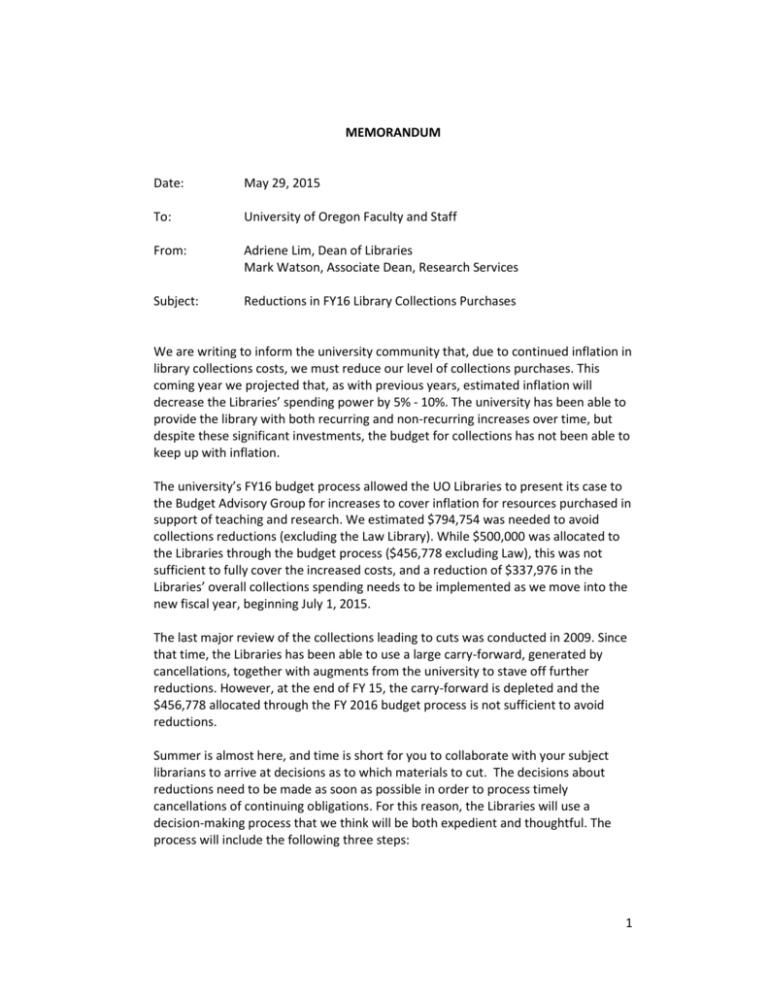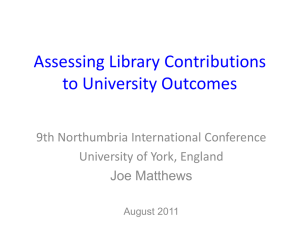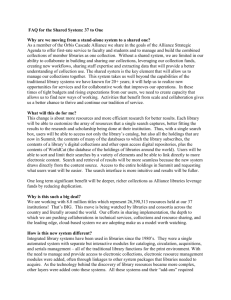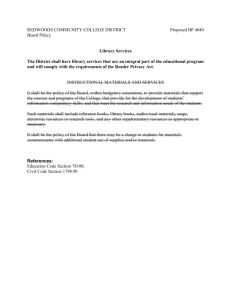the campus community - UO Libraries
advertisement

MEMORANDUM Date: May 29, 2015 To: University of Oregon Faculty and Staff From: Adriene Lim, Dean of Libraries Mark Watson, Associate Dean, Research Services Subject: Reductions in FY16 Library Collections Purchases We are writing to inform the university community that, due to continued inflation in library collections costs, we must reduce our level of collections purchases. This coming year we projected that, as with previous years, estimated inflation will decrease the Libraries’ spending power by 5% - 10%. The university has been able to provide the library with both recurring and non-recurring increases over time, but despite these significant investments, the budget for collections has not been able to keep up with inflation. The university’s FY16 budget process allowed the UO Libraries to present its case to the Budget Advisory Group for increases to cover inflation for resources purchased in support of teaching and research. We estimated $794,754 was needed to avoid collections reductions (excluding the Law Library). While $500,000 was allocated to the Libraries through the budget process ($456,778 excluding Law), this was not sufficient to fully cover the increased costs, and a reduction of $337,976 in the Libraries’ overall collections spending needs to be implemented as we move into the new fiscal year, beginning July 1, 2015. The last major review of the collections leading to cuts was conducted in 2009. Since that time, the Libraries has been able to use a large carry-forward, generated by cancellations, together with augments from the university to stave off further reductions. However, at the end of FY 15, the carry-forward is depleted and the $456,778 allocated through the FY 2016 budget process is not sufficient to avoid reductions. Summer is almost here, and time is short for you to collaborate with your subject librarians to arrive at decisions as to which materials to cut. The decisions about reductions need to be made as soon as possible in order to process timely cancellations of continuing obligations. For this reason, the Libraries will use a decision-making process that we think will be both expedient and thoughtful. The process will include the following three steps: 1 1. The Libraries will take reductions out of the portion of the collections budget that supports infrastructure involved in providing access to library materials (e.g., reserve and replacement funds, interlibrary loan fees, binding, and new materials for the popular reading collection). These reductions will have little to no direct impact on users, although they will necessitate some adjustments and implementation of efficiencies behind the scenes. 2. Cuts will be made to discretionary funds set aside for one-time purchases. These centrally administered funds have provided a means for making larger, one-time purchases. Liquidating this line reduces our flexibility but also mitigates the impact of the reductions on the fund lines that directly support academic disciplines. 3. The remainder of the reductions will be proportionally spread across the entire budget with each discipline funded at a level of $3,000 or more taking a 5% across-the-board cut. The Libraries’ subject specialists will work with contacts in each discipline to determine the best way to achieve the target reduction. In some areas, monographic funds will be reduced more heavily than serials, or vice versa. The UO Libraries is committed to making the best use of the money made available to support teaching and research. Indeed, the provision of high-quality content and collections is a prominent goal in the library’s strategic plan. Even though reductions are challenging, they are also inevitable—at least until the academy is able to regain control of its intellectual output and help reshape a scholarly communications ecosystem that has increasingly fallen into the purview of for-profit, commercial publishers. If you have questions, suggestions, or concerns, please address them to your Subject Specialist (http://library.uoregon.edu/specialists), or contact Mark Watson at mrwatson@uoregon.edu. Information about the collection review and reduction will be posted on the Libraries’ web site at: http://library.uoregon.edu/node/4982. 2






